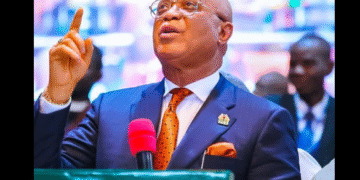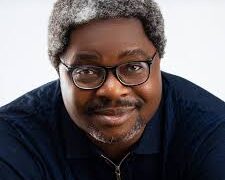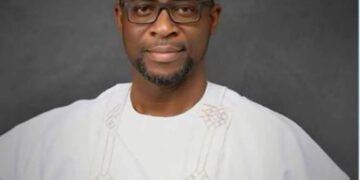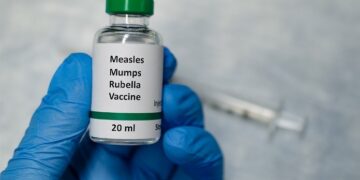President Bola Ahmed Tinubu on Thursday officially commissioned the African Medical Centre of Excellence (AMCE) in Abuja, describing the project as a monument to African resilience and innovation, and a bold step toward Nigeria’s emergence as a global healthcare hub.
This is just as the country has secured over $2.2 billion in health sector commitments through the Nigeria Health Sector Renewal Investment Initiative, launched by the Tinubu administration in December 2023.
The initiative, which is already underway, aims to renovate over 17,000 primary health centres, train 120,000 frontline health workers, and double national health insurance coverage within three years.
Speaking during the commissioning ceremony of the AMCE, President Tinubu, who was represented by his deputy, Vice President Kashim Shettima, noted that it is not just about unveiling a structure of steel and bricks, but also unveiling Nigeria’s “collective refusal to accept medical vulnerability as destiny.”
The President narrated reforms and investments made since he took office two years ago, including the signing of an Executive Order to unlock the healthcare value chain and the launch of the Presidential Initiative to Unlock the Healthcare Value Chain (PVAC).
These policies, he said, have intensified local pharmaceutical production, improved regulatory systems, and expanded access to diagnostics.
“But our efforts did not end there. In December 2023, we launched the Nigeria Health Sector Renewal Investment Initiative. That initiative secured over $2.2 billion in health sector commitments, with clear, measurable targets: to renovate over 17,000 primary health centres, train 120,000 frontline health workers, and double health insurance coverage within three years. These are not aspirations. These are milestones already in motion,” the President explained.
The President noted that AMCE, a state-of-the-art facility developed by the African Export-Import Bank (Afreximbank) in partnership with King’s College Hospital, London, will serve as a leading centre for advanced treatment, medical training, and research.
The facility, according to him, hosts the largest stem cell laboratory in West Africa and will expand to include a teaching hospital, nursing school, and residential quarters for medical personnel.
Paying tribute to Afreximbank President Prof. Benedict Oramah, President Tinubu said, “I must pay tribute to Afreximbank and its visionary President, Professor Benedict Oramah, for seeing what many dared not dream. This is what becomes possible when institutions rise to African challenges with African solutions.”
President Tinubu also stressed the importance of infrastructure investment through the Renewed Hope Infrastructure Development Fund, even as he said, “A world-class hospital cannot function on a dirt road, and no MRI machine works without stable electricity. We are investing in the roads, power, and connectivity that breathe life into health facilities.
“With your planned Medical and Nursing School on this campus, and with partners ranging from King’s College London to the University of Wisconsin, you are laying the foundation for a new generation of African medical specialists—specialists who will no longer be exported but empowered at home,” he stated.
He assured continued government support for the initiative, saying it is a strategic investment in Nigeria’s future. “This is not just a place to treat the sick—it is a place to train for the future,” he added.
Also speaking, the Minister of Finance and Coordinating Minister of the Economy, Mr. Wale Edun, said that with the establishment of the Afreximbank African Medical Centre of Excellence, Nigeria is today healthier and wealthier than before.
He pointed out that if figures were to be displayed, the edifice would cost not less than $400 million mobilised by the private sector.
He said this type of establishment could not come at a better time than this for Africa to have a hospital that can handle different medical associations on the continent, adding, “The hospital is a marvel of science and modernity of facility.”
Earlier in his remarks, President and Chairman of the Board of Directors of African Export-Import Bank, Prof. Benedict Orama, said the event was a testimony that “society is better-off serving lives that burying its death and that it’s a living person that can contribute to the development and social transformation.”
Recalling his ordeal as a sick person admitted at the King’s College Hospital in London, he stated that the only way he could appreciate the Almighty God, the Afreximbank colleagues and those who saved his life was to contribute to creating quality healthcare infrastructure and services.
Prof. Orama said one of the contributions he could make to Africa was to help Afreximbank “to deliver on its well-developed and documented structured strategy on medical care delivery and with Star Alliance, Kings College Hospital in London and twelve years of sick medical experience, the African Medical Centre of Excellence opens its door in Abuja.
“African Medical Centre of Excellence is not just to provide top-notch medical care but also catalyse the transformation of the African health sector,” he added.
Giving his goodwill message, the British High Commissioner to Nigeria, Mr. Richard Montgomery, thanked the President of Afreximbank, the Board of African Medical Centre for Excellence and everyone who worked to put the hospital in place.
He said the hospital is an important institution that will stop medical tourism in Nigeria, as it will attract people to the nation to get the same benefits they would have received outside the shores of the country.
Others who spoke at the event were Tanzania’s President Samia Suluhu Hassan, represented by Dr Jenista Joakim Mhagama, Minister of Health, Tanzania; Professor Clive Kay, Chief Executive, King’s College Hospital NHS Foundation Trust; Dr. Tajudeen Raji, Acting Deputy Director General and Head, Division of Public Health Institutes and Research, Africa Centre for Disease Control and many others.












































Discussion about this post